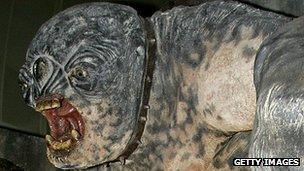Q&A: Who are internet trolls - and how is the law changing?
- Published

Frank Zimmerman, who sent a threatening email to MP Louise Mensch, escaped a jail sentence
Website operators in the UK may soon have to identify people who have posted defamatory messages online, allowing the victim to undertake legal action against the "troll" rather than against the website.
But who are these people and how will this proposed new law be different from the current regulations?
Who are the internet trolls?
The term has come to mean those behind intentionally provocative online actions intended to cause grief or incite an angry response.
This can happen in online forums, message boards, chat rooms, and on social networks and microblogging sites, as well as personal emails.
Trolls may exist in any online community that allows comments from users - for example, video-streaming sites, such as YouTube and online video-games sites.
They can act individually or in groups - known as "colluding" trolls. One member of such a group often behaves as the obvious troll, while the others disguise themselves as normal members of the online community.
These trolls in disguise then defend the comments of the overt one.
Trolls may also target the recently bereaved, posting offensive material about the dead person.
After <link> <caption>17-year-old Charlotte Porter </caption> <url href="http://www.bbc.co.uk/news/uk-england-kent-17900962" platform="highweb"/> </link> died in 2010, her parents said that her memory had been "destroyed" by abusive online messages on her Facebook memorial site.
One of the latest examples of an internet troll is Frank Zimmerman, <link> <caption>who was given a 26-week suspended prison sentence</caption> <url href="http://www.bbc.co.uk/news/uk-england-gloucestershire-18391970" platform="highweb"/> </link> after sending an offensive email to Corby MP Louise Mensch.
He was also banned from contacting a host of celebrities, including Lord Sugar.
What is the law at the moment?
Currently, a website operator is liable for everything that appears on its site.
So if somebody believes that something defamatory has been written about them online, he or she may have to take the website to court for redress, incurring huge costs.
Justice Secretary Ken Clarke explained: "As the law stands, individuals can be the subject of scurrilous rumour and allegation on the web with little meaningful remedy against the person responsible.
"Website operators are in principle liable as publishers for everything that appears on their sites, even though the content is often determined by users.
"But most operators are not in a position to know whether the material posted is defamatory or not and very often - faced with a complaint - they will immediately remove material."
How might the new law be different?
The UK Ministry of Justice is proposing a defamation bill, which is being debated in the Commons, to make it easier for people to challenge what has been written about them.

Until recent years, the term "trolls" referred to supernatural beings in Norse mythology
If people think that there is defamatory content being posted about them online, instead of taking action against the website where the information appears, they can ask the website operator to give them the name of the person who posted the remarks.
This way, they can take legal action against trolls directly, requiring them to remove the defamatory posts.
"Our proposed approach will give greater protection to operators of websites who comply with a procedure to identify the authors of allegedly defamatory material," said Justice Secretary Ken Clarke.
"The government wants a libel regime for the internet that makes it possible for people to protect their reputations effectively but also ensures that information online can't be easily censored by casual threats of litigation against website operators.
"It will be very important to ensure that these measures do not inadvertently expose genuine whistleblowers, and we are committed to getting the detail right to minimise this risk."
The BBC understands that the term "troll" will not figure in the bill, and the new law will only refer to "defamatory" content.
Which sites would be covered by the rule change?
The proposals would apply to all websites, regardless of which country their servers or headquarters were based.
However, the claimant would need to be able to show that the UK was the appropriate place to bring the action.
What about privacy?
Privacy International, an organisation that campaigns at an international level on privacy issues, says that "there is a concern that gun-shy website operators will start automatically divulging user details the moment someone alleges defamation in order to shield themselves from libel actions".
"A great deal of the content posted by internet trolls is not actually defamatory, instead constituting harassment, invasion of privacy or simply unpleasant but lawfully expressed opinion," Emma Draper, head of communications at Privacy International, told BBC News.
"However, if the choice is between protecting users' anonymity and avoiding a potentially costly lawsuit, many small operators are not going to be overly concerned about whether or not a user has genuinely defamed the complainant."
- Published12 June 2012
- Published15 May 2012
- Published30 April 2012
- Published13 September 2011